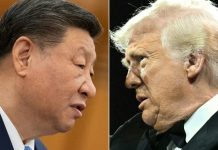Taking China’s feat forward to set up military bases around the world, reports of a new military base in Cambodia have set alarm bells ringing to its neighbours and claimants of the South China Sea.
After Apaches, Chinooks & Poseidons, Boeing Looks To Ink Two Major ‘Fighter Jet’ Deals With India
Reportedly, Beijing is supporting the expansion at the Cambodia Ream Naval Base. The project includes expanding the port and development of a ship repair facility.
A report in WSJ revealed that China and Cambodia signed a secret agreement that would allow the Chinese armed forces access to the Cambodian Navy base for the next 30 years with automatic 10-year renewals after that.
The deal will give China exclusive rights to part of the naval base on the Gulf of Thailand, which is close to an airport constructed by a Chinese company. According to the draft, China would be able to deploy military personnel, store weapons and berth warships, said the WSJ report.

The officials from both the countries have denied claims of China setting up a military base, calling it “fake news”.
Prime Minister Hun Sen of Cambodia has continuously denied plans for a Chinese military base stating that the Combadian constitution forbids foreign military bases on its soil.
A report published by Center for Strategic and International Studies (CSIS), a Washington based think tank, citing satellite images said that the Cambodian government has demolished a US-built facility at the country’s Ream Naval Base.
“The building was one of several US-funded facilities on the base which were reportedly to be relocated after Cambodia struck a secret deal to grant China access to Ream,” CSIS wrote.
Washington and its allies have been vying to convince Cambodia as their “preferred security partner” however, Pentagon officials said it appeared Phnom Penh had turned toward Beijing, reported WSJ.
With rising security concerns in the South China Sea, Washington has also been worried about Phnom Penh’s decision to grant a 99-year lease to a Chinese firm, Union Development Group (UDG) for at least 20 per cent of Cambodia’s coastline.
Tianjin-based UDG is developing $3.8 billion luxury resorts along the coastline. Washington has announced sanctions against the entity for human rights violations for the forced displacement of Cambodians to seize land for construction activities.
Secretary of State Mike Pompeo also cited “credible reports” that Dara Sakor could be used to host Chinese military assets. “If so, (this) would go against Cambodia’s constitution and could threaten Indo-Pacific stability, possibly impacting Cambodia’s sovereignty and the security of our allies,” he added in a statement.
The US Treasury Department describes the company as a Chinese state-owned entity. “UDG-funded activities have forced Cambodians from their land and devastated the environment, hurting the livelihoods of local communities, all under the guise of converting Cambodia into a regional logistics hub and tourist destination,” the Treasury Department said.
Amid brewing tensions between the US and China in the South China Sea, the militarisation of the Cambodian naval base will surely increase Chinese influence in the region. A Chinese presence at either facility would also “greatly complicate” the ability of the US to come to the aid of Taiwan if Beijing decides to attack the island, a U.S. official told WSJ, as some American forces would arrive via the Strait of Malacca or the outer reaches of the South China Sea.
China has already managed to create several maritime bases in Asia including Pakistan, Sri Lanka, the Maldives, Pakistan, Bangladesh which has already strengthened its influence in the region.
Another military base in Cambodia is bad news for not just other contenders in the South China Sea but the US who has been fighting for influence in the region by flexing its muscles in the last few months.




